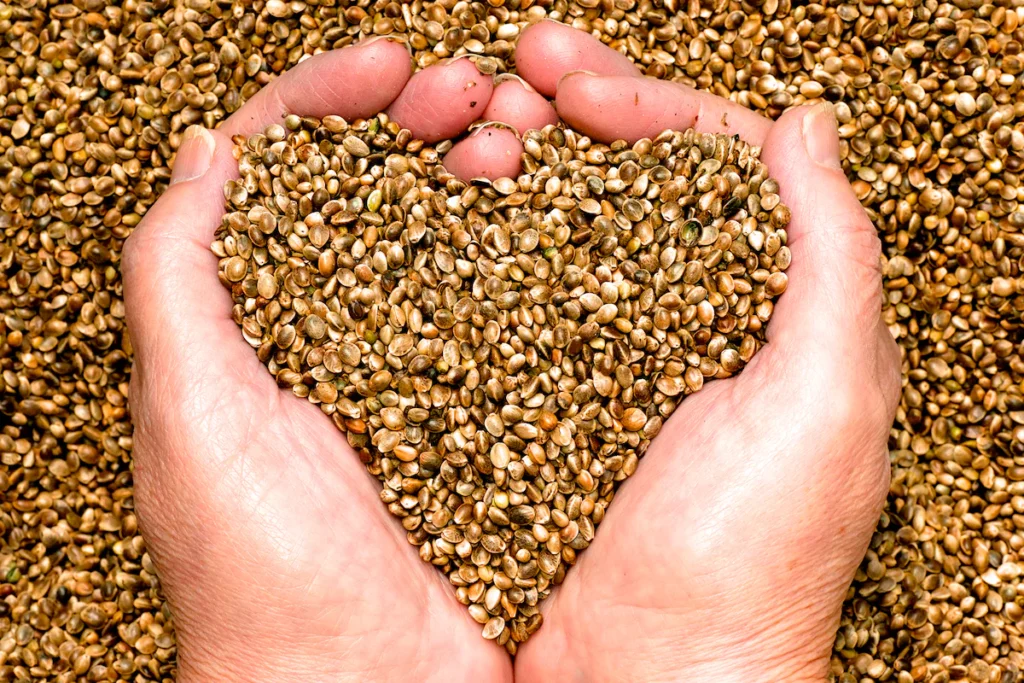Hemp seeds (Hanfsamen)have been gaining popularity in recent years as a nutrient-dense superfood. These tiny seeds come from the Cannabis sativa plant, a cousin to marijuana, but they contain little to no THC (tetrahydrocannabinol), the psychoactive compound in cannabis. Instead, hemp seeds are packed with essential nutrients, healthy fats, and protein, making them a valuable addition to a balanced diet. In this comprehensive guide, we’ll explore the benefits of hemp seeds, how they are used, and what you need to know when buying them.
What Are Hemp Seeds?
Hemp seeds, also known as hemp hearts, are the edible seeds of the Cannabis sativa plant. While the cannabis plant is most commonly associated with its use in recreational and medicinal marijuana, the seeds themselves contain negligible amounts of THC and are primarily valued for their nutritional properties. Hemp seeds are small, brown seeds that have a mild, nutty flavor and are often consumed raw, roasted, or cooked into a variety of dishes.
Hemp seeds are a complete protein, meaning they contain all nine essential amino acids, which makes them especially valuable for vegetarians and vegans. They are also rich in essential fatty acids, vitamins, and minerals, making them a powerhouse of nutrients.
Nutritional Benefits of Hemp Seeds
Hemp seeds are an excellent source of essential nutrients that support overall health and wellness. Here’s a breakdown of the key nutritional benefits:
1. Rich in Protein
Hemp seeds are one of the few plant-based sources of complete protein, which means they contain all nine essential amino acids that the body cannot produce on its own. This makes hemp seeds an excellent protein source for vegetarians, vegans, and those looking to reduce their intake of animal products. Roughly 25% of the calories in hemp seeds come from protein, with just three tablespoons providing around 10 grams of protein.
2. High in Healthy Fats
Hemp seeds are rich in essential fatty acids, particularly omega-3 and omega-6, which are crucial for heart health, brain function, and inflammation control. Hemp seeds have an ideal ratio of omega-6 to omega-3 (3:1), which is considered optimal for reducing inflammation and promoting cardiovascular health.
In addition to omega-3 and omega-6 fatty acids, hemp seeds contain gamma-linolenic acid (GLA), a special type of omega-6 fatty acid that has been linked to anti-inflammatory effects and is often used to treat conditions such as arthritis and eczema.
3. Packed with Fiber
Hemp seeds are an excellent source of both soluble and insoluble fiber, especially when consumed with the hull (outer shell) intact. Soluble fiber is beneficial for digestive health as it helps regulate blood sugar levels and supports healthy cholesterol levels. Insoluble fiber, on the other hand, adds bulk to the stool, promoting regular bowel movements and helping prevent constipation.
Fiber also plays a key role in weight management by promoting feelings of fullness, reducing hunger, and helping regulate appetite.
4. Loaded with Vitamins and Minerals
Hemp seeds are packed with a wide range of vitamins and minerals, including vitamin E, magnesium, phosphorus, potassium, and iron. Vitamin E acts as an antioxidant, helping protect cells from damage caused by free radicals. Magnesium is essential for nerve and muscle function, while iron supports healthy blood production and prevents anemia.
Health Benefits of Hemp Seeds
Thanks to their impressive nutritional profile, hemp seeds have been associated with several health benefits. Below are some of the key ways hemp seeds may positively impact your health:
1. Support Heart Health
The high levels of omega-3 and omega-6 fatty acids in hemp seeds are beneficial for heart health. These essential fats help reduce blood pressure, lower cholesterol levels, and decrease the risk of heart disease. In particular, the omega-3 fatty acids in hemp seeds can help reduce inflammation in the arteries, improving blood flow and reducing the risk of atherosclerosis.
Additionally, the arginine content in hemp seeds, an amino acid that produces nitric oxide, can help relax blood vessels and lower blood pressure, further contributing to cardiovascular health.
2. Improve Skin Health
Hemp seeds have been shown to benefit skin health due to their balanced fatty acid profile. The omega-3 and omega-6 fatty acids in hemp seeds help support the skin’s natural barrier, keeping it hydrated, reducing dryness, and minimizing irritation. Hemp seeds may also be helpful in treating conditions such as eczema, psoriasis, and acne, thanks to their anti-inflammatory properties.
GLA found in hemp seeds has also been linked to reduced symptoms of dermatitis, such as dryness, itchiness, and overall discomfort.
3. Aid in Digestion
As a rich source of fiber, especially when the seeds are consumed with the hull intact, hemp seeds can support healthy digestion. The insoluble fiber in hemp seeds helps regulate bowel movements and prevent constipation, while the soluble fiber promotes the growth of beneficial bacteria in the gut, which is essential for maintaining a healthy digestive system.
4. Support Weight Management
Hemp seeds can be a useful addition to a weight management plan, thanks to their combination of healthy fats, protein, and fiber. The high protein content helps promote satiety, reducing overall calorie intake by curbing hunger. Similarly, the fiber content of hemp seeds helps regulate appetite by slowing digestion and providing a feeling of fullness for longer periods.
5. Reduce Inflammation
The presence of omega-3 fatty acids and GLA in hemp seeds gives them strong anti-inflammatory properties. Chronic inflammation is linked to several health conditions, including arthritis, heart disease, and metabolic disorders. By reducing inflammation, hemp seeds may help mitigate the symptoms of these conditions and support overall health.
Common Uses of Hemp Seeds
Hemp seeds are incredibly versatile and can be used in a wide range of culinary and non-culinary applications. Here are some common ways to use hemp seeds:
1. As a Nutritional Topper
One of the simplest ways to incorporate hemp seeds into your diet is by sprinkling them over your meals. You can add hemp seeds to smoothies, yogurt, oatmeal, salads, soups, or even baked goods for an extra boost of nutrition.
2. Hemp Seed Oil
Hemp seed oil, which is extracted from the seeds, is rich in essential fatty acids and can be used as a finishing oil for salads, dressings, or drizzling over dishes. It’s important to note that hemp seed oil should not be used for high-heat cooking, as it has a low smoke point.
3. Hemp Protein Powder
Hemp seeds are often ground into protein powder, which is a popular supplement for athletes, bodybuilders, or anyone looking to increase their protein intake. Hemp protein powder can be added to shakes, smoothies, or baked goods.
4. Non-Dairy Milk Alternative
Hemp seeds can be blended with water to create a nutritious, dairy-free milk alternative known as hemp milk. It’s a great option for those who are lactose intolerant or looking for a plant-based milk.
5. Skincare Products
Hemp seeds and hemp seed oil are commonly used in skincare products due to their moisturizing and anti-inflammatory properties. They can be found in creams, lotions, and oils designed to soothe dry or irritated skin.
What to Consider When Buying Hemp Seeds
When buying hemp seeds, it’s important to choose high-quality products to ensure you’re getting the best nutritional benefits. Here are some tips to help you make an informed purchase:
1. Look for Organic Certification
If possible, choose hemp seeds that are certified organic. Organic hemp seeds are grown without the use of synthetic pesticides or herbicides, which ensures that the product is free from harmful chemicals.
2. Check for Non-GMO Labels
Look for non-GMO hemp seeds to ensure that the product has not been genetically modified. Non-GMO seeds maintain the natural nutritional profile and integrity of the plant.
3. Choose Hulled or Shelled Hemp Seeds
Hulled or shelled hemp seeds are seeds that have had their outer shell removed. These are easier to digest and offer a smoother texture, making them ideal for eating raw or adding to recipes. However, if you’re looking for more fiber, consider buying whole hemp seeds with the hull intact.
4. Check the Expiration Date
Because hemp seeds contain a high amount of healthy fats, they can go rancid if not stored properly. Always check the expiration date when buying hemp seeds and store them in a cool, dark place, such as your refrigerator, to extend their shelf life.
Conclusion
Hemp seeds are a nutritional powerhouse, offering a wealth of health benefits thanks to their high protein content, healthy fats, fiber, and essential vitamins and minerals. Whether you’re looking to improve heart health, support digestion, or simply incorporate more plant-based foods into your diet, hemp seeds are a versatile and valuable addition to your pantry.
By understanding the benefits of hemp seeds and how to use them, as well as considering important factors when buying them, you can make informed choices and enjoy the numerous health advantages that these seeds offer.






